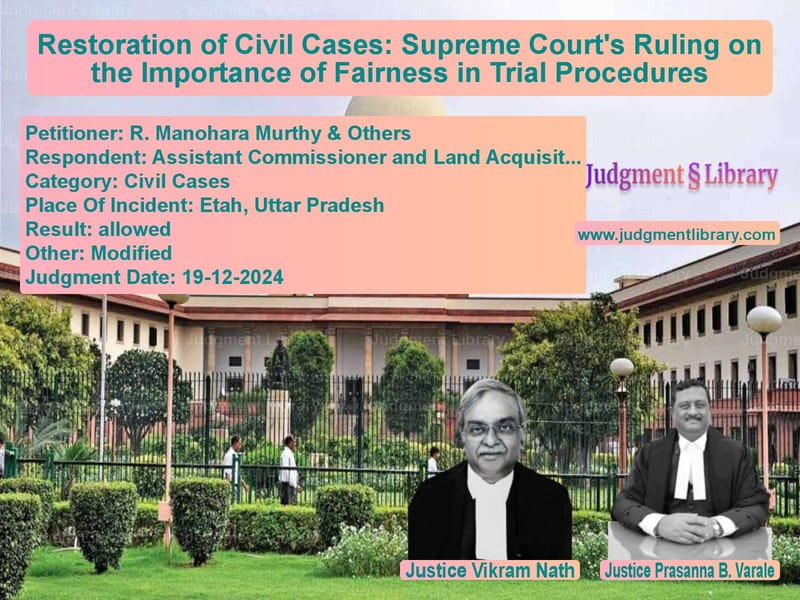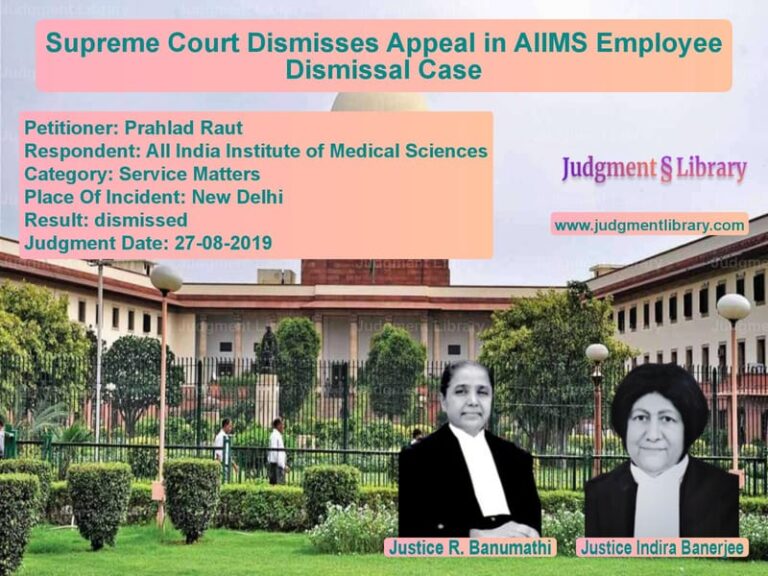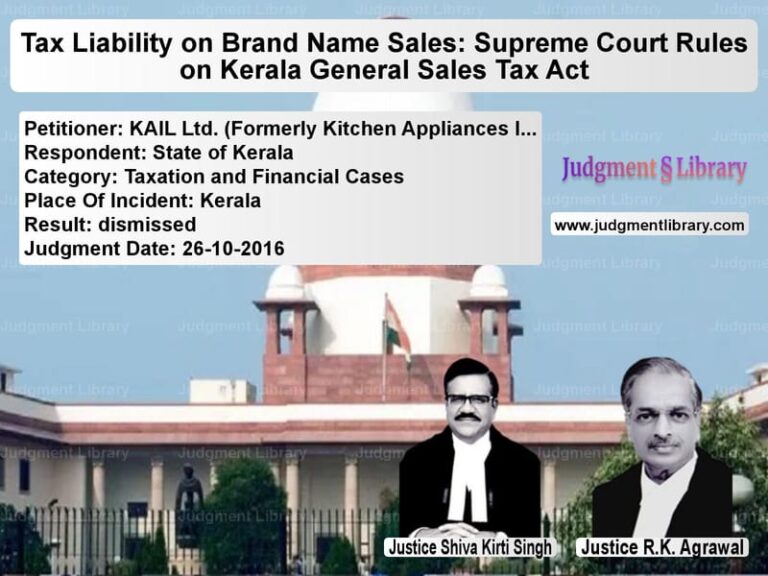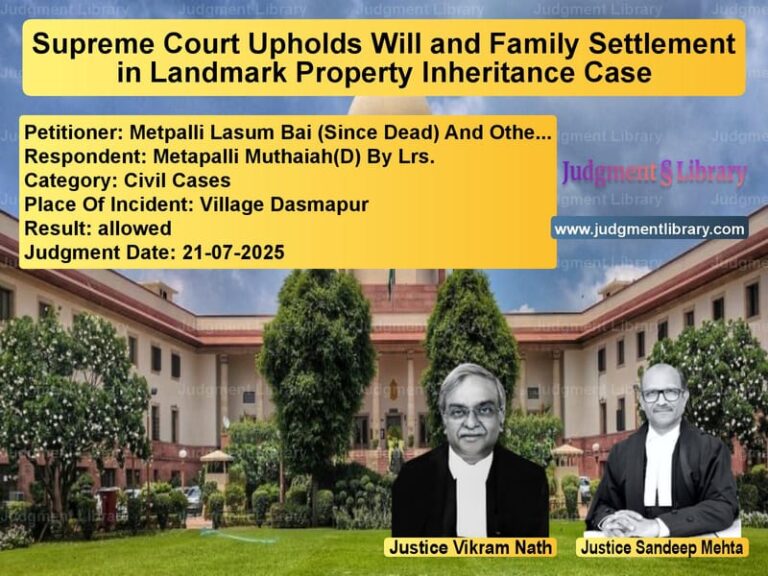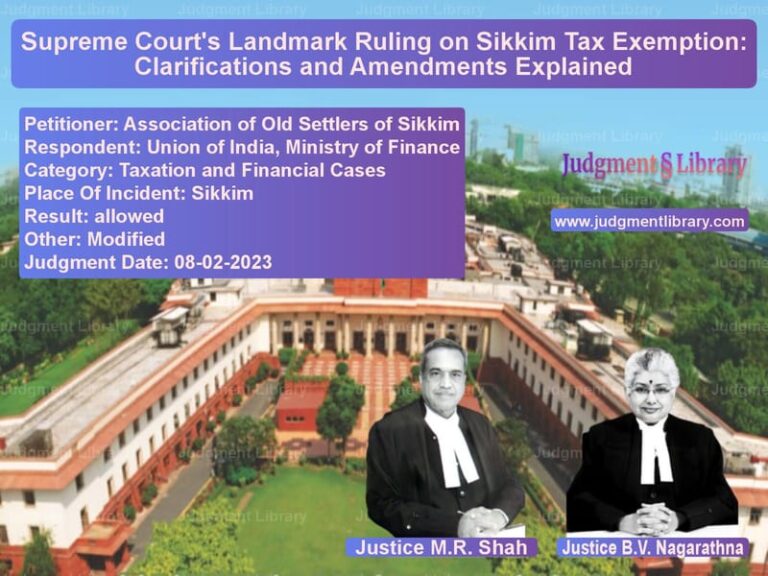Restoration of Civil Cases: Supreme Court’s Ruling on the Importance of Fairness in Trial Procedures
The case of R. Manohara Murthy & Others vs. Assistant Commissioner and Land Acquisition Officer addresses critical issues regarding the restoration of civil cases, with a particular focus on procedural fairness and the importance of providing litigants the opportunity to present their cases. This Supreme Court judgment, delivered on December 20, 2024, examines the necessity of expediting civil cases, the role of procedural errors, and the issue of condonation of delay in civil proceedings.
Background of the Case
The appellants, R. Manohara Murthy and others, had filed a case against the State of Maharashtra for the restoration of a civil suit that was dismissed due to the absence of the appellants. The dismissal occurred after a long period of inaction on the part of the appellants, which had led to an ex parte decision being made in favor of the respondent. The appellants were unaware of the ex parte order due to their previous counsel’s failure to properly communicate the legal proceedings. They filed a restoration application under Order IX Rule 13 and Section 151 of the Civil Procedure Code (CPC) for the re-hearing of their case, which was initially denied. The High Court upheld the dismissal of the restoration application, leading the appellants to approach the Supreme Court.
Arguments of the Petitioner
The petitioner, represented by their counsel, presented several key arguments, which include:
- The appellants were unaware of the ex parte decree, as their previous counsel failed to inform them about the court proceedings, despite their trust in the lawyer to handle the case appropriately.
- The dismissal of the restoration application was unfair, as the appellants had legitimate reasons for their absence, primarily due to negligence by their counsel.
- The restoration application filed under Section 151 of the CPC was made within a reasonable time after the appellants became aware of the ex parte decree.
- According to legal precedents, litigants should not suffer because of mistakes made by their representatives, and the Court should be flexible in applying procedural rules in the interest of justice.
Arguments of the Respondent
The respondent, represented by the State of Maharashtra and the Assistant Commissioner, countered the petitioner’s claims by asserting:
- The appellants were aware of the case’s progress, and their absence from the proceedings constituted a neglect of their legal duties. As per the law, litigants must ensure their representation is actively involved in court proceedings.
- The restoration application was filed after a considerable delay and should have been accompanied by an application for condonation of delay under Section 5 of the Limitation Act, which was not done.
- The dismissal of the restoration application by the High Court was correct, as the appellants failed to provide adequate justification for their absence or the delay in filing the restoration petition.
Supreme Court’s Analysis
The Supreme Court carefully examined the arguments presented by both the appellants and the respondent. The Court highlighted the following points in its analysis:
- The Court emphasized the importance of fairness in legal proceedings and noted that procedural technicalities should not prevent the delivery of justice. It acknowledged the fact that the appellants were unaware of the proceedings due to their previous counsel’s negligence.
- The Court noted that the purpose of filing restoration applications is to provide litigants a second chance, especially when their previous counsel’s errors prevent them from participating in the trial.
- The issue of delay was addressed by highlighting that while Section 5 of the Limitation Act typically requires an application for condonation of delay, the circumstances in this case justified a more lenient approach, considering the appellants’ bona fide actions.
- The Court referred to legal precedents that support the principle that litigants should not suffer due to errors or omissions made by their legal representatives, which would otherwise deny them the right to a fair trial.
Final Judgment
The Supreme Court ruled in favor of the appellants, allowing their appeal and restoring the case. The Court made the following key points in its final judgment:
- The ex parte decree passed against the appellants was set aside, and the restoration application filed under Order IX Rule 13 of the CPC was allowed.
- The Court stressed the need for flexibility in procedural matters to ensure that justice is not denied to litigants because of minor technicalities or delays caused by their counsel.
- The Court directed the lower courts to expedite the hearing of the restored case, acknowledging the long period the matter had already been pending.
- The Court also emphasized that while litigants must be vigilant about their case, they should not be penalized for their counsel’s mistakes if they had acted diligently in seeking to restore their case once they became aware of the judicial errors.
Conclusion
The Supreme Court’s decision in this case underscores the Court’s commitment to ensuring fairness in legal proceedings and the importance of not allowing technicalities to override the principles of justice. This judgment will likely have far-reaching implications in future cases involving the restoration of civil suits and the role of legal representatives in safeguarding the rights of litigants.
Petitioner Name: R. Manohara Murthy & Others.Respondent Name: Assistant Commissioner and Land Acquisition Officer.Judgment By: Justice Vikram Nath, Justice Prasanna B. Varale.Place Of Incident: Etah, Uttar Pradesh.Judgment Date: 19-12-2024.
Don’t miss out on the full details! Download the complete judgment in PDF format below and gain valuable insights instantly!
Download Judgment: r.-manohara-murthy-&-vs-assistant-commission-supreme-court-of-india-judgment-dated-19-12-2024.pdf
Directly Download Judgment: Directly download this Judgment
See all petitions in Contract Disputes
See all petitions in Property Disputes
See all petitions in Landlord-Tenant Disputes
See all petitions in Judgment by Vikram Nath
See all petitions in Judgment by Prasanna Bhalachandra Varale
See all petitions in allowed
See all petitions in Modified
See all petitions in supreme court of India judgments December 2024
See all petitions in 2024 judgments
See all posts in Civil Cases Category
See all allowed petitions in Civil Cases Category
See all Dismissed petitions in Civil Cases Category
See all partially allowed petitions in Civil Cases Category

